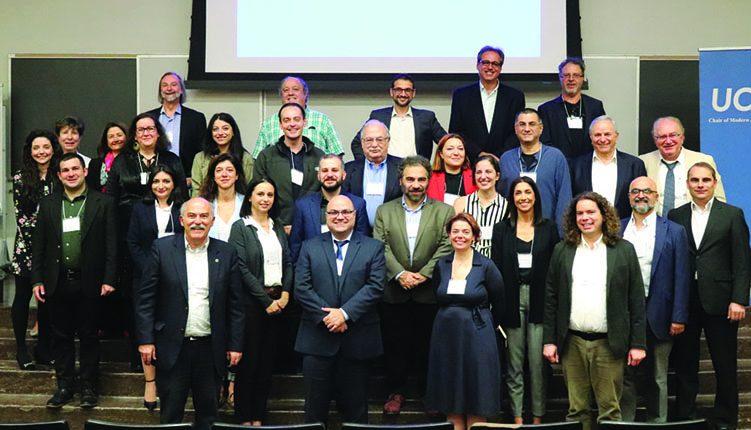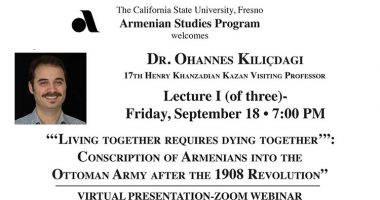UCLA — On October 12-13, 2019, the Society for Armenian Studies held a major conference at UCLA “Diaspora and ‘Stateless Power’: Social Discipline and Identity Formation Across the Armenian Diaspora during the Long Twentieth Century” to mark its 45th anniversary. The two-day conference also honored Khachig Tölölyan, one of the most prominent scholars of diaspora studies in general and of Armenian diaspora in particular.
Co-sponsored by the Calouste Gulbenkian Foundation, the Richard Hovannisian Endowed Chair in Modern Armenian History (UCLA), the Narekatsi Chair in Armenian Studies (UCLA), the Meghrouni Family Presidential Chair (University of California, Irvine), the Institute of Armenian Studies (University of Southern California), the Armenian Studies Program (California State University, Fresno), the Armenian Studies Program (California State University, Northridge), and the National Association for Armenian Studies and Research (NAASR), the Conference brought together scholars from Armenia, England, France, Germany, Holland, Mexico, Portugal, and the United States.
The conference opened on the morning of October 12th at the UCLA Rolfe Hall, Room 1200. In his opening remarks Sebouh Aslanian (UCLA), acknowledged the presence of Richard Hovannisian, the co-founder of SAS and the first chair of Modern Armenian history at UCLA, thanked SAS president Bedross Der Matossian (University of Nebraska, Lincoln) and former president Barlow Der Mugrdechian (California State University, Fresno) for making the conference happen.
Aslanian dedicated most of his opening remarks to Tölölyan’s life as “scholar, editor and educator,” whose work has significantly shaped the fields of diaspora studies and Armenian diaspora in particular. Tölölyan’s life story, Aslanian observed, “is quite representative of a more general pattern of a twentieth century diaspora condition that binds all of us here, whether we like it or not, together as accomplices in the same history of displacement, transplantation, rebirth, of being in-between, of living in difference and creative hybridity, a life, in short, that is punctuated by civil wars and revolutions. This is the very same diaspora condition the study of which Tölölyan has long interrogated, made sense of, and helped shape in profound ways.”
SAS President Der Matossian acknowledged the founders of the SAS, namely Richard G. Hovannisian, Dickran Kouyumjian, Nina Garsoïan, Avedis Sanjian, and Robert Thomson, and the important role the SAS has played since then in promoting Armenian Studies in the United States and internationally. “There are many challenges facing Humanities in the 21st century, and Armenian Studies is also adapting itself to the new realities of the academic world,” Der Matossian stated. “One of the continuing challenges is how to make Armenian Studies relevant to the current academic and non-academic audience.” Der Matossian continued enumerating the new Podcast Series and other projects that the SAS has embarked on since 2018 in order to disseminate knowledge of the field and make it relevant to a 21st century audience. He thanked all the sponsors and organizers of the conference and invited the first chair and panelists to take the stage.
The first session was titled “The Liminal Space: Armenian Immigrants in the Transnational Context”. Chaired by Salpi Ghazarian (USC), the panelists explored the historical and contemporary Armenian migration trajectories across North America, Europe and the Middle East. Nareh Galsytan (University of Milan) reexamined the diaspora-homeland relations by focusing on the Syrian nationals of Armenian and Assyrian backgrounds in the Netherlands. Carlos Antaramian (El Colegio de la Frontera Norte, Mexico) explored the Armenian immigration patterns to Mexico, illegal border crossings between Mexico and the U.S., and the formation of Armenian community in Tijuana in 1923-1932. Boris Adjemian (AGBU Nubar Library, Paris) emphasized the sedentariness of diasporas by examining the Armenian experiences from Addis Ababa, Jerusalem to Valence and Paris. Gegham Mughnetsyan (University of Southern California) tackled yet another less explored area by focusing on the Armenian displaced persons experiences from Funkerkaserne camp near Stuttgart, Germany, to their contemporary residence in Montebello, California.
Chaired by Houri Berberian (University of California, Irvine), the second session “Imagining the Diasporic Space: Social Memory and Cultural Production in the Armenian Diaspora” explored the literary and cultural production, and their effects across the Armenian diaspora. Focusing on the works by Vahe Oshagan, Hakob Karapents and Vahe Berberian, Lilit Keshishyan (University of Southern California) explored the ways in which ‘stateless power’ informed those writers’ cultural character. Helen Makhdoumian (University of Illinois, Urbana-Champaign) focused on Michael Arlen’s Passage to Ararat to suggest a critical examination of transnational memory work and kinship-making through translation and transculturation. Talar Chahinian (University of California, Irvine) examined the Western Armenian literary canon that established the so-called hayetsi mode of production and its limiting effects on the possibilities for benefiting from multi-local and transnational contexts. Sylvia Alajaji (Franklin & Marshall College) suggested a critical examination of the concept ‘Armenian music’ by discussing the various perceptions of Komitas within Armenian diasporic contexts.
Session three in the afternoon titled “Institutions, Governmentality and Power Relations in the Shaping of Armenian Diasporic Diversities” was chaired by Vahram Shemmassian (California State University, Northridge). Hasmik Khalapyan (American University of Armenia) examined the power struggle in the diasporic Armenian press during the late 19th and early 20th century Europe. Simon Payaslian (Boston University) explored the conceptualizations of homeland independence in the Armenian-American periodical press in the first decades of the 20th century. Nareg Seferian (School of Public and International Affairs, Virginia Tech) suggested a close reading of the Ottoman-Armenian constitution through the framework of governmentality that resembled something close to a statehood within a state with the patriarch having the ultimate authority. Christopher Sheklian (Zohrab Information Center) highlighted the important role of the Armenian Apostolic Church in incorporating the Armenian immigrants from Baku and Syria into established Armenian communities and in shaping their identities. Daniel Fittante (University of California, Los Angeles) pointed to the emergence of what he called ‘ethnopolitical entrepreneurs’ by examining the challenges of incorporating immigrants into political processes based on the case study of Armenians in Glendale.
The afternoon of October 12th continued with a remarkable keynote speech by Tölölyan (Wesleyan University), titled “From the Study of Diasporas to Diaspora Studies.” The speech explored three broad themes: diaspora studies and studies of diasporas, power, and choice. By examining the historical development of the conceptualizations of the term ‘diaspora’ since the ancient biblical texts until modern scholarship also within the Armenian tradition, Tölölyan suggested new directions for future research. He continued to suggest thinking of diasporic ‘stateless power’ as a form of ‘soft power’ that needs further exploration in the case of Armenians and theoretically.
The morning session of October 13th, chaired by Barlow Der Mugrdechian (California State University, Fresno) was titled “At Home in the Diaspora: Armenian Communities in the Middle East”. Sossie Kasbarian (University of Stirling, UK) examined the various experiences of Syrian Armenians in the Republic of Armenia, challenging the conventional perceptions of ‘home’, ‘homeland’ and ‘diaspora’. Ara Sanjian (University of Michigan, Dearborn) explored the political and confessional contexts in Lebanon and the nature of Lebanese political parties to demonstrate how Armenian political parties internalized the prevailing social-political inner workings of non-Armenian Lebanese political parties. Tsolin Nalbantian (Leiden University, Netherlands) focused on the complex relations between the Catholicosate of Ejmiatsin, Catholicosate of Cilicia, various Armenian and Lebanese political circles developing during and after the controversial 1956 elections in the Catholicosate of Cilicia. The fourth panelist, Talin Suciyan (Ludwig Maximilian University of Munich), examined the Armenian experiences in Turkey to show how denial had been the most important denominator of Armenians living in Turkey.
The second panel was devoted to the Armenian Diaspora Survey, a project sponsored by the Armenian Communities Department of Calouste Gulbenkian Foundation and implemented by the Armenian Institute, London. Chaired by Kasbarian, the panel was titled “Giving Voice to the Diaspora: The Armenian Diaspora Survey Project”. Hratch Tchilingirian (Oxford University), the director of Armenian Diaspora Survey, presented the results of the Pilot stage implemented in Boston, Pasadena, Marseille (France), and Cairo (Egypt) in May/June 2008, and the current survey being carried out in Argentina, Canada, Lebanon and Romania. The panelists, Razmik Panossian (Calouste Gulbenkian Foundation) and Tölölyan stressed the importance of the survey in providing rich data that researchers, policy makers and academics can use for developing informed policy proposals or for academic research and publications.
The final session, titled “Diaspora Policy and Diaspora Politics: Discourses, Ideologies and Governmentality in (Soviet) Armenia-Diaspora Relations,” was chaired by Marc Mamigonian (NAASR). Hratsin Vardanyan (Republic of Armenia) discussed some typologies of diasporas and examined the pros and cons of various classifications of the Armenian Diaspora. Vahe Sahakyan (University of Michigan, Dearborn) suggested a critical examination of the concept ‘governmentality’ in the context of diaspora, and demonstrated how ‘governmental efforts’ of diasporic elites in the Armenian case led to the fragmentation of the Armenian diasporic communities locally in many countries and transnationally. The final talk by Hagop Gulludjian (University of California, Los Angeles) explored the ways in which the competing ideologies and visions on Armenianness among Armenian diasporic actors have dealt with the problems of diaspora.
In his closing remarks Peter Cowe (University of California, Los Angeles) highlighted several takeaways that complicate the perceptions of diaspora, nation-state, home, homeland, host land, as well as the agency and role of diasporan elites and institutions in shaping diasporic subjectivities. Cowe closed the conference by expressing appreciation of the work done by the organizers, speakers, sponsors, students and the audience “rendering this conference the success it has truly been.”
The SAS is an international body, composed of scholars and students, whose aims are to promote the study of Armenian culture and society, including history, language, literature, and social, political, and economic questions; to facilitate the exchange of scholarly information pertaining to Armenian studies around the world; and to sponsor panels and conferences on Armenian studies.
societyforarmenianstudies.com










